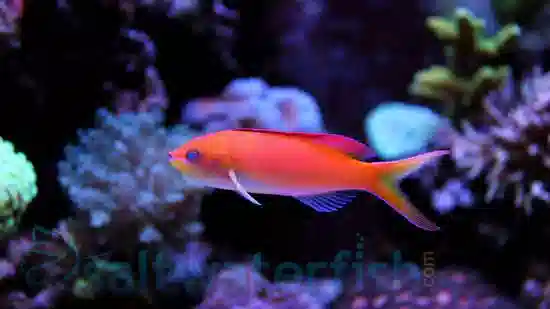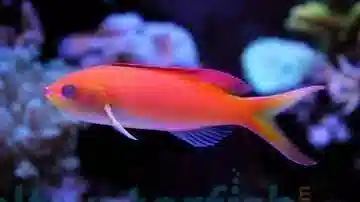Dispar Anthias
Nemanthias dispar
(20 Reviews)

Dispar Anthias
Nemanthias dispar
(20 Reviews)
{{ item.name }}
Size: {{ item.extra_field_3 }}
${{ getFormattedPrice(item.saleprice) }} ${{ getFormattedPrice(item.price) }}
To join the waiting list, click here
Free Shipping
With
$199.00
or more in Marine Life.
More details...
Dispar Anthias Care Facts
| Care Level: | Moderate |
|---|---|
| Temperament: | Peaceful |
| Diet: | Carnovore |
| Reef Safe: | Yes |
| Minimum Tank Size: | 70 gallons |
| Max Size: | 4 inches |
The Dispar Anthias (Nemanthias dispar): A Vibrant Beauty for Saltwater Aquariums
The Dispar Anthias (Nemanthias dispar) is an appealing and vibrant species that adds color and energy to saltwater aquariums. Known for its stunning appearance and lively behavior, this anthias is a sought-after choice among marine enthusiasts. Let's explore the Dispar Anthias' habitat, reef-safe nature, size, lifespan, diet, compatibility, suitable tank mates, sexual dimorphism, tank requirements, other common names, and compatible tank mates.
Habitat and Range of Dispar Anthias
The Dispar Anthias is native to the warm waters of the Indo-Pacific region, ranging from the Red Sea to the western Pacific Ocean. In the wild, they are commonly found in coral-rich lagoons and reef areas, forming large schools and seeking shelter among corals and rock formations.
Reef-Safe Beauty of Dispar Anthias
The Dispar Anthias is reef-safe and poses no threat to corals or other invertebrates. They enhance the beauty of reef aquariums with their vibrant colors and active swimming behavior.
Size and Lifespan for the Dispar Anthias
Dispar Anthias can grow to about 3 or 4 inches (7.5 to 10 cm) in length. With proper care, they can have a lifespan of up to five years in a well-maintained aquarium.
Diet and Feeding Habits of the Dispar Anthias
Dispar Anthias are omnivores in their natural habitat, feeding on zooplankton and small crustaceans. In a home aquarium, they readily accept a diet of high-quality frozen or live foods such as brine shrimp, mysis shrimp, and marine pellets.
Peaceful Compatibility of the Dispar Anthias
Dispar Anthias are generally peaceful but can be aggressive towards other anthias species, especially when kept in small groups. They are best kept in larger aquariums with plenty of hiding spots and open swimming areas.
Suitable Tank Mates for the Dispar Anthias
Peaceful and colorful, cardinalfish make suitable tank mates for the Dispar Anthias.
These small and peaceful fish share a compatible tank environment with the anthias.
Peaceful gobies can coexist harmoniously with the Dispar Anthias, adding diversity to the tank.
Some species of blennies are suitable tank mates that add character and charm to the aquarium.
Peaceful jawfish species can be compatible tank mates for the Dispar Anthias.
Sexual Dimorphism of the Dispar Anthias
Male and female Dispar Anthias exhibit sexual dimorphism, where males display more intense and vibrant coloration, especially during courtship displays. Females are generally smaller and have more subdued coloration.
Tank Requirements for the Dispar Anthias
To provide a suitable environment for the Dispar Anthias, the aquarium should have plenty of live rock for hiding and swimming and open areas for schooling. Stable water parameters and high water quality are essential for their well-being.
Other Common Names Known for the Dispar Anthias
Besides the name "Dispar Anthias," this species is also known as the "Lyretail Anthias" or "Nemanthias Lyretail."
In conclusion, the Dispar Anthias (Nemanthias dispar) is a vibrant and captivating addition to saltwater aquariums. Its stunning appearance and lively behavior make it popular among marine enthusiasts. Aquarists can enjoy the beauty and energy of these mesmerizing anthias by providing them with a suitable environment, compatible tank mates, and proper care.
Was besties with a shrimp for a few days, then disappeared. Maybe he was a victim of the anemone also?
Reviewed by: Connie Pope on Jan. 14, 2026
Reviewed by: Roque Palomo on Dec. 14, 2025
First time buyer and was very happy with the experience and the fish too :)
Reviewed by: Rob Koca on Nov. 30, 2025
Excellent, doing great
Reviewed by: Steve Morosin on Nov. 27, 2025
Reviewed by: Mason Mckellips on Nov. 25, 2025
Reviewed by: Steve Morosin on Oct. 13, 2025
A little shy at 1st but starting to become more active. Seems healthy.
Reviewed by: John Arcuri on Sept. 17, 2025
Reviewed by: Shayne Wall on May 20, 2025
Vibrant colors appear healthy
Reviewed by: Frank Eley on July 28, 2024
Beautiful fish schooling with my chromes
Reviewed by: Anthony Little on May 2, 2024
Great price, colorful
Reviewed by: Shaun Hale on May 2, 2024
So far doing fine, eating well
Reviewed by: Kenneth Devorak on March 4, 2024
Doing well
Reviewed by: Daniel Todd on Feb. 14, 2024
Reviewed by: Frank Eley on Feb. 1, 2024
Active fish eating swimming around
Reviewed by: Anthony Little on Feb. 1, 2024
Reviewed by: Ishaan Patel on Jan. 30, 2024
Reviewed by: Brad Barton on Nov. 12, 2023
One of my favorite fish! So much personality and the peach coloring is always an eye catcher! This fish has become best friends with one of my shrimp and it lets the shrimp clean it! Very happy with my purchase
Reviewed by: Kristi on May 30, 2015
We received our Dispar Anthias FedEx & she or he : ) arrived healthy & beautiful. With proper acclimation she is doing wonderful! Her neighborhood contains 2 clown fish, 1 other Anthias, a Blenny & a Sexy Red Shrimp. All are getting along terrific! My only advice is if your FedEx arrives after 12 noon is to pay the addition $5 for the upgrade that it arrives by 10:30 AM. We live in FL. We also recommend to remind "Saltwater" to put cold pack in box so fish do not fry.
Reviewed by: M. Helm on Feb. 2, 2015
Bought 5 of these for my 125 gallon display tank and added them with a large purple tang, Blue Hippo Tang, coral beauty, six line wrasse, pink and blue spot goby, and 3 other different Anthias. They all stuck together and now in the am all the anthias are in one corner all together. Healthy live stock and eating from day 1.
Reviewed by: Greg on Dec. 16, 2014








